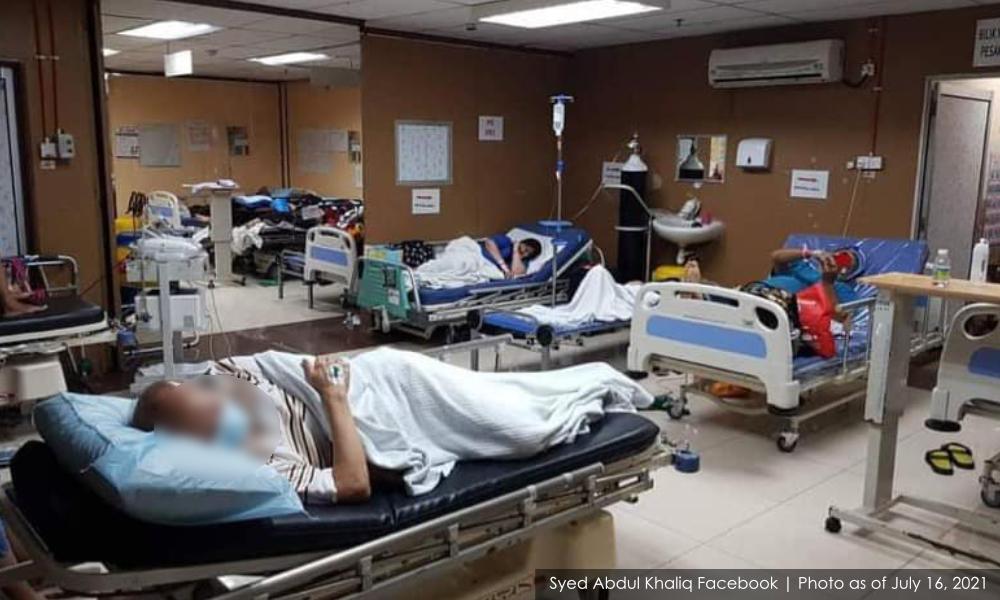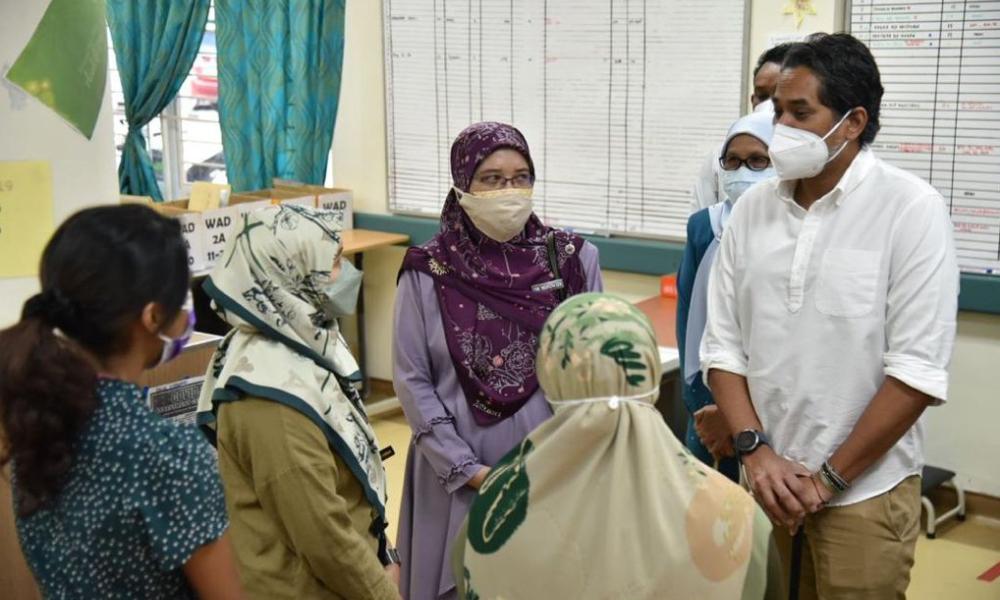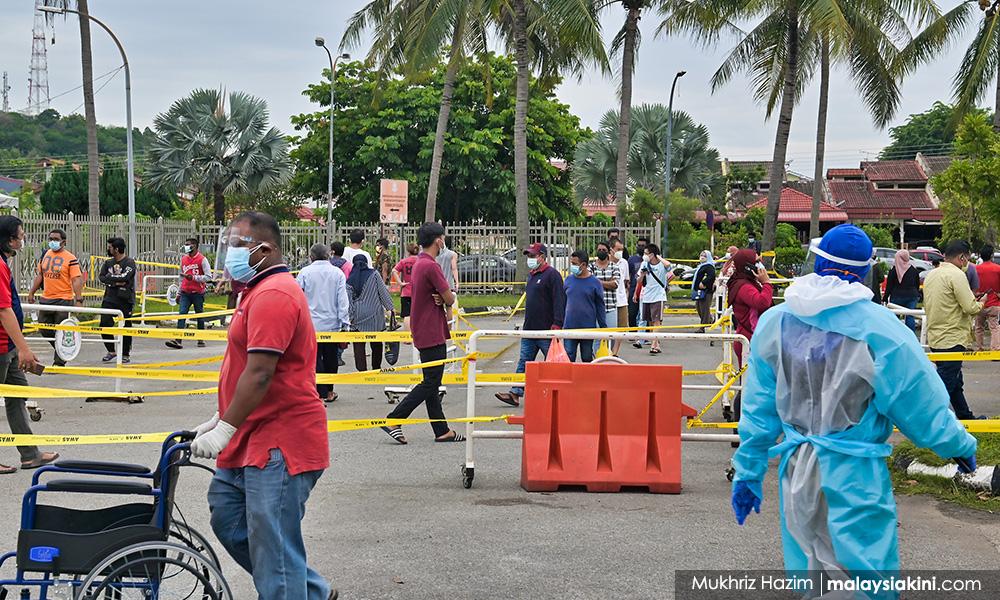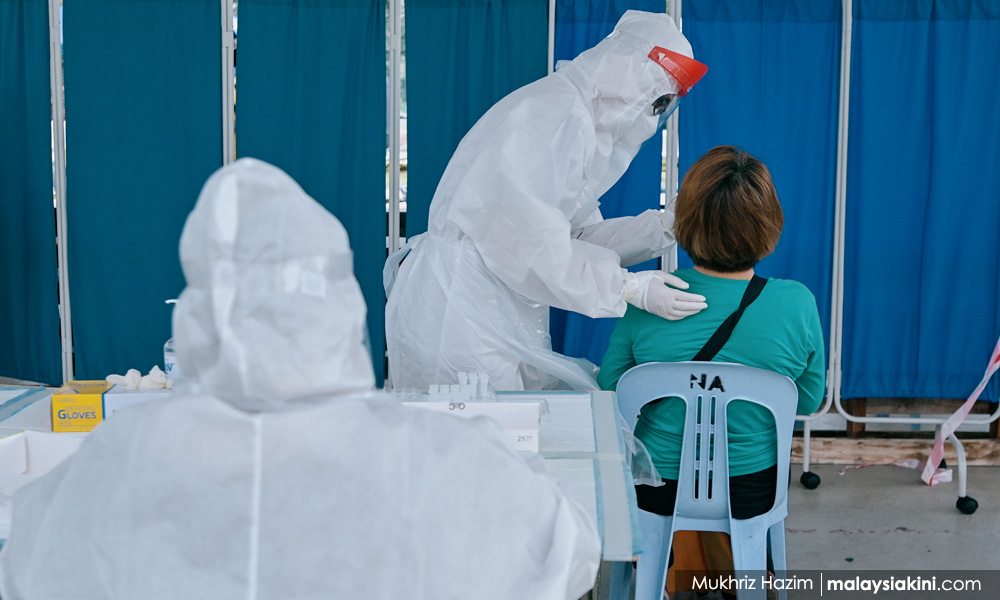COVID-19 | Newly minted Health Minister Khairy Jamaluddin aims to bring down the number of serious Covid-19 cases and brought-in-dead (BID) cases within the next 94 days.
The two goals are key indicators for his performance, the Rembau MP told an interview on Friday, where he laid out a list of key performance indexes (KPI) to be achieved within his first 100 days in office.
“...I want to focus on two key targets - one is on the number of intensive care unit (ICU) cases which is the proxy indicator for the seriousness of the disease.
“And number two is the number of BID cases. We want to reduce the number of people dying outside the hospital.
“This is what we want to work on to achieve within the first 100 days,” he told Malaysiakini during an interview held at the ministry's headquarters in Putrajaya to speak about his 100 days goal as health minister.
Khairy, alongside other cabinet members, were given 100 days by Prime Minister Ismail Sabri Yaakob to prove their mettle. The countdown started on Monday when they were sworn in before the Yang di-Pertuan Agong.
For ICU cases, the target was to reduce the number of bed usage to less than 70 percent. According to Khairy, ICU beds that cater to Category 4 and 5 Covid-19 patients reflect the seriousness of the situation.
For non-ICU beds, Khairy wants to see usage reduced to less than 50 percent of the capacity allocated for Covid-19 treatment.

On BID cases, the minister said he is looking at bringing down the rate of Covid-19 patients who died without being able to reach a hospital to 15 percent. The highest rate of BID cases recorded by MOH so far was 21 percent, which happened during the 31st epidemiological week (Aug 1 to 7, 2021).
“We are figuring out how to try to identify this group and bring them to the hospital quickly before they deteriorate,” he said.
Khairy said he also has another obvious target - which is to bring down the number of daily Covid-19 cases.
However, he said it was difficult to come up with a projection at this juncture, given that the ministry is also facing several variables that are not within their control.
“Of course, we are aiming to lower the number of cases. But with the new variants, we are not sure how much we can bring it down.
“That is why we are focusing on the outcome of Covid-19. There are countries that continue to report a high number of new cases, but the outcome of the disease such as ICU cases and deaths have decreased a lot. So I want to focus on that.”
Below is the list of other KPI related to Covid-19 that Khairy and his team at the Health Ministry have to accomplish by Dec 8.

Vaccination
As has been announced previously, Khairy said he targets to have at least 80 percent of the country’s adult population to be vaccinated.
Another aim is to vaccinate as many teenagers aged between 12 and 17, an exercise which the ministry expects to embark on next week, starting with Sarawak.
“This is so that when the new school year starts, our teenagers have already completed their immunisation,” he said.
The ministry would also come up with a policy on booster doses, including a plan on its implementation, and a decision on whether it is safe to mix-and-match vaccines.
Improving healthcare facilities
Khairy said the Health Ministry will ensure that no state will ever face shortages of ICU bed capacity again, and those that need to boost their capacity would have field units sent their way.
He promised that all health facilities will have enough oxygen cylinders for their Covid-19 operations, and the ministry will ensure no facility will face such equipment shortages.
Virtual Covid-19 assessment centres (CACs) would also be set up in five states - Kelantan, Malacca, Penang, Johor and Perak.
This is so that patients no longer have to be physically present at CACs, emulating what the ministry has practised in the Klang Valley.

New policies for endemic phase
Khairy said a set of new standard operating procedures (SOPs) which are simpler and easier to understand would be issued for public use when Malaysia moves into the endemic phase, expected to be by October.
He is working together with the ministers in charge of the National Security Council, Finance Ministry, and Communications and Multimedia Ministry to formulate the new guidelines.
“So, much simpler, clearer SOPs will be developed within 100 days especially for the endemic phase, and that will replace the mountains and mountains of pages under the NSC currently, which we think are too complicated and difficult to understand,” he said.
The government is also going to increase their efforts in communicating with the public on compliance with public health measures.
A National Testing and Contact Tracing Policy is also being developed, according to Khairy, and is to be announced before the deadline.
The new policy would set out the requirement for Covid-19 testings during the endemic phase, including how frequent an individual needs to get themselves screened for the coronavirus.
“For example, if one is found to be positive during the endemic phase, what is the process for contact tracing and isolation.
“So we will be clear when we go into a new normal.”

Improving testing and contact tracing
In an effort to further ease public access to Covid-19 self-test kits, the ministry targets to approve at least 40 more kits, adding to another 40 which are already available.
The move is aimed at providing the public with more choices, and to increase competition among companies with the hope to drive down their prices.
According to Khairy, they will also liberalise the selling of the test kits, where consumers can soon purchase the product outside pharmacies and health facilities, including at grocery stores.
“We will also be providing for free or subsiding test kits for the B40 community. We will announce this from time to time.”
Khairy said the MySejahtera application would see more features added to allow those with long Covid-19 symptoms to report their situation, and improve contact tracing.
“Contact tracing will be drastically improved over the first 100 days. There will be more automated contact tracing to ensure that we are safe when we go into the endemic phase.”

Data transparency
As part of his promise to make the ministry more transparent in its pandemic reporting, Khairy said he would have more frequent engagement sessions with the media.
This is on top of the granular Covid-19 data that are to be uploaded on the open-source GitHub starting next week.
The minister has also opened an email address especially for the ministry's frontliners who want to report issues they face at work.
He said the email address menteri@moh.gov.my is to ensure that employees have an open communication channel with him, and he accepts complaints that are sent anonymously.
Other issues
In his KPI list, Khairy also made several other promises, including that the Health Ministry would announce the clinical result for the ivermectin trial.
For the record, ivermectin is a drug that recently caught controversy in Malaysia, as certain quarters claim that it is effective in treating Covid-19 patients and pushed for the ministry to adopt it in its treatment regime.
Khairy said he also aims at coming up with the best solution on the issue of the ministry's contract doctors. He said that there are several measures that are being worked on, but declined to reveal them as the ministry is still in discussion with the Treasury Department and the Civil Service Department. -Mkini




No comments:
Post a Comment
Note: Only a member of this blog may post a comment.